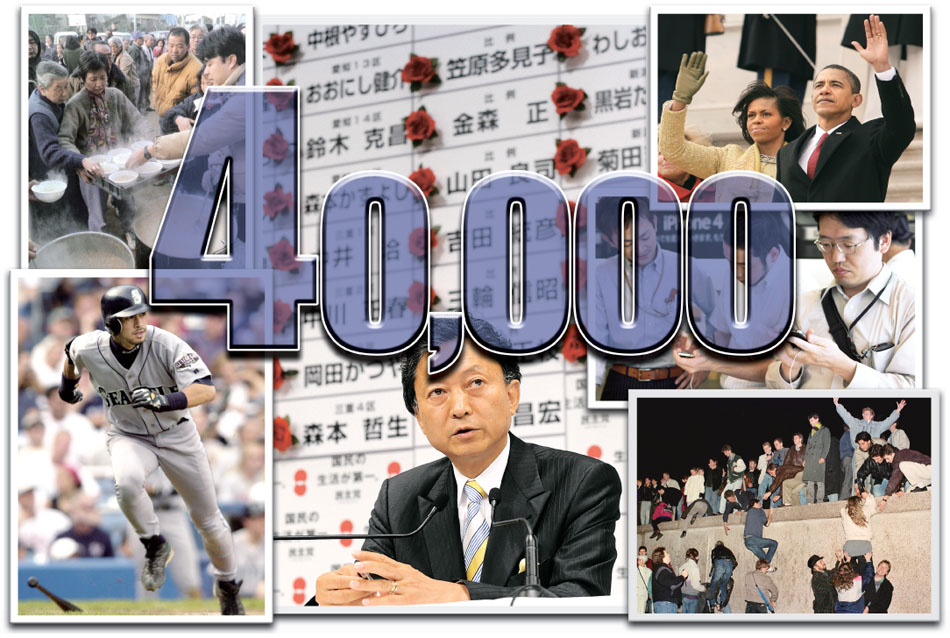

 |
 |

The Japan Times today celebrates its 40,000th issue since its foundation in 1897. We have invited opinion leaders and experts to talk about how Japan has evolved since we reached our 30,000th issue in 1982 — and discuss the way forward. 40,000th Issue SpecialJapan adrift in a changing worldYasuhiro Nakasone Last year, Japan saw the first full-scale change of government since the end of World War II, with the Democratic Party of Japan ousting the long-running Liberal Democratic Party from power in a landslide victory in the House of Representatives election. MessageBuilt to serve a growing communityPresident Yukiko Ogasawara
Dear readers, Foreign relationsImplications for trans-Pacific tiesKent E. Calder The U.S-Japan alliance, now celebrating its 50th anniversary in current form, has been remarkably enduring. It has persisted, largely without incident, since the 1960 Security Treaty crisis, for more than twice as long as the other major strategic configuration in Japan's modern history — the Anglo-Japanese Naval Treaty of 1902. Economy1985 to 2010: All seems just the sameNoriko Hama "Who controls the past controls the
future: who controls the present controls
the past." Society and cultureA new consensus needs to emergeRoger Pulvers In the summer of 1982, Nagisa Oshima made his film about the complex interrelationship of captor and captive in war, "Merry Christmas, Mr. Lawrence." A large cast from Japan, Britain, Australia and New Zealand assembled on the island of Rarotonga in the Cook Islands, to re-enact the arbitrary brutalities and unforeseeable intimacies of the prisoner-of-war camp. Publishing industryJapan's publishing industry at a crossroadsHiroshi Kagawa Since Internet use spread worldwide, newspapers and the publishing industry at large have been facing many challenges. In fact, just like The Japan Times, many Japanese newspaper companies are also involved in publishing books and other media content, the key heritages of print media that humans invented. Readers' voiceReaders share Japan Times storiesThe Japan Times has invited its readers to share their experiences related to reading our newspaper. The following are some of the essays contributed by longtime readers. Good reading every morning since 1966 Essential source even during wartime 'Close to English' for over 50 years Unique features keep the mind sharp Golden photo opportunities Lifelong merits of English newspapers Spark of inspiration from a color image From foreign teacher to businessman English language educationMake English a true multicultural languageNobuyuki Honna On Aug. 15, 1808, the HMS Phaeton entered Japan's southwestern territory without permission and unconditionally demanded food, fuel and water. The British warship was allowed to stay for three days before leaving Nagasaki, mainly due to the Japanese official translators only knowing the Dutch language. Media round tableDebating English-language media’s role in Japan todayOver the past three decades, the environment surrounding the media industry has dramatically changed due to new technologies. The Internet has spurred the emergence of blogs and social media, like Twitter and Facebook, enabling people to spread news and communicate with each other anywhere in the world through handy gadgets, such as PCs, smart phones and netbooks. In such a new age filled with advanced technologies, what are the challenges for the media industry? Will the role of English-language media, such as The Japan Times, change? To explore these questions, The Japan Times recently invited three experts on English media and held a round-table discussion. Media round tableTechnology’s influence on journalismIn the second part of the discussion, the experts discussed the challenges that conventional media companies, including English-language media, face with the emergence of advanced technologies and the growth of social media. "When I think about the role of English media, I often think about the foundation of The Japan Times during the Meiji Era. That was the time when all the foreigners started coming to Japan. The Japan Times people thought that we needed to present a real Japan, the face of Japan, and bridge the gap between the two different perceptions. I think that role has not changed. There is still a gap. Even with the Internet and the latest technologies, we cannot overcome the gap." |